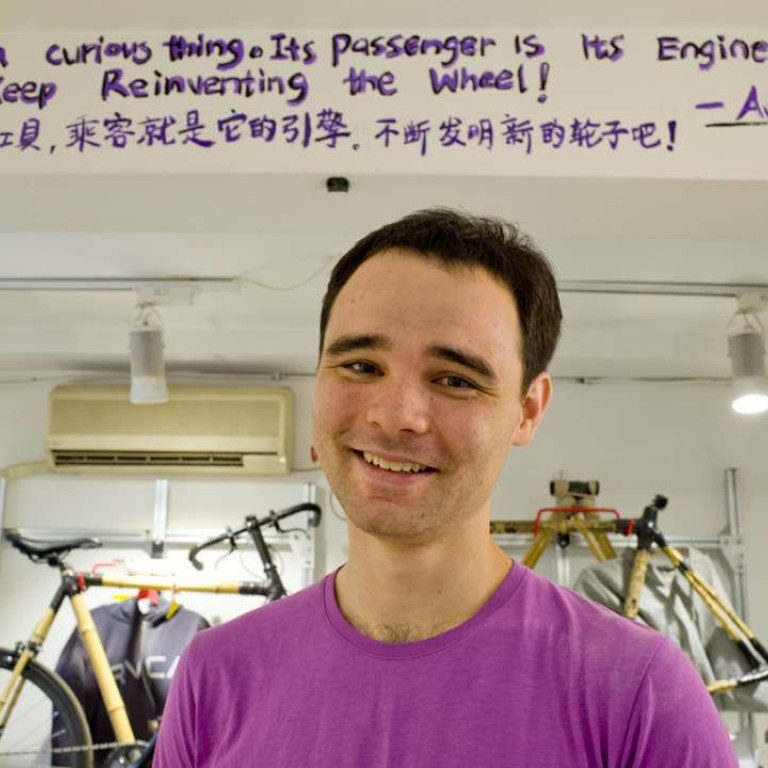
Beijing, bamboo bicycles and how to get young Chinese back into cycling
Every weekend, a workshop in a hutong near the old drum tower in central Beijing springs to life, with lessons given teaching people how to make bamboo-framed bikes from scratch. David Wang, a 30-year-old American who started the workshop “Bamboo Bicycle Beijing” three years ago, believes the project can help create a renewed interest in cycling culture in Beijing, where streets and alleyways used to be dominated by millions of bicycles.
What made you interested in transport culture in China?
I’ve been working in China since 2009. I started out doing anthropological work and eventually got a job researching youth culture in Beijing. A lot of my clients were car companies, like BMW, Mercedes, Audi and they all wanted to know what Chinese youth think about mobility in China and what they want for their future. I thought it was very interesting because I went throughout China and every single young person I spoke to, people who are 18 years old or 20 years old, they all have the same aspiration for their mobility: they all want to own a car. And if they could, own a really nice car, like a BMW or even better. And then when I began to probe and ask a lot more questions about it, I found that the reason they wanted to own a car wasn’t necessarily for transportation, it was as a status symbol. Especially the guys would say, “in order to get married, I need to own a car”, “my fiancée’s parents need to see me own a house and own a car”. There was another guy who said in order to get a promotion or to have some status at his company, it was better for him to arrive at work in a car. A young entrepreneur said in order to meet with clients, he had to arrive in a car, even if it was faster to take the subway or ride a bicycle.
I’ve talked to probably hundreds of different young people about this question and it got me thinking: why is it so unbalanced? Why can’t it be culturally valuable to cycle? Why can’t it be culturally valuable to take the subway? And I realise that a big reason for a lot of our environmental problems, our health problems, a lot of problems in the city, is because more and more people are owning cars and there is a huge culture around that. It’s not just about money, it’s not just about technology. Actually, the culture we have makes us want to own cars and cars aren’t good for society.
How did you come up with the idea of making bamboo bikes?
I came up with the bamboo bike idea while I was doing all this research. Almost all of the apartment complexes in China have this big pile of thrown out bicycles that nobody uses. And for me, I didn’t want to buy a bike and there were all these thrown out bicycles. It’s such a waste. I thought maybe I could just use one. So I began fixing a lot of old bikes from the 1980s when China, especially Beijing, had many, many bicycles.
One of the bicycles I picked up had a little bit too much rust on it. I began thinking what other materials I could I use and I thought of bamboo. I learned how to make a bamboo bike from the internet and I made another bike, then another and eventually I ran out of bikes to make for my friends. So I did a Kickstarter project and opened a workshop where people can come and build their own bikes.
Why bamboo of all materials?

Compression strength is also very high, but for bikes the most important is tensile strength. Another thing is, it’s not only very strong, but also incredibly light. A bamboo bike is usually lighter than a steel bike. It’s like a very light aluminium bike, but it’s much more environmentally friendly.
What change do you want to bring through the workshop?
I hope Chinese youth can become part of creating a new mobility culture in Chinese cities. So it doesn’t have to be like “I must own a BMW”, “I must own a Mercedes”. I really hope that I can work with them to create a cycling culture in Beijing so that cycling can be cool, it can mean something about who you are as an individual.
Through that process of building a bike, number one, they began to like the bike; number two, they realise how important bicycling can be; and number three, it begins to represent them. For youth, identity is really an important issue. It’s how you explore who you are.
What do you think about the future of cycling culture in Beijing?
I think Beijing is at a really important point right now because it has this history, one of the best histories of cycling in the world. If you look at pictures from the 1980s, it was amazing for the cyclist. They had really wide cycling lanes, they had stop plates for bicycles, they had everything for bicycles. But Beijing right now is at an important point because it needs to decide how are we are going keep that culture. I do think Beijing can be very safe for cyclists, it can be very convenient for cyclists, but it all relies on whether or not the city itself supports the infrastructure. And right now in China there is less and less support for that bicycling infrastructure. There is a lot more to work on.

